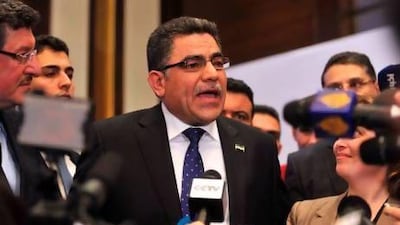ISTANBUL // The man chosen by Syria's main opposition body to head an interim government as prime minister yesterday pledged to build a "new Syria", but internal critics voiced doubts about his ability to lead.
Ghassan Hitto faced his first test yesterday when the Syrian government accused rebels of deploying a chemical weapon, a charge denied by those fighting to topple the regime of Bashar Al Assad. The US government also denied the accusation.
Mr Hitto, 50, who is believed to have Islamist leanings, received 35 of 49 votes in a meeting of the Syrian National Coalition (SNC) in Istanbul in the early hours yesterday. He was supported by the Muslim Brotherhood, which is a powerful bloc within the opposition.
He is expected to name other members of the interim government in the coming weeks. His government's main task will be to run regions in the east and north of the country that are no longer under the control of Mr Al Assad after two years of fighting.
The opposition also hopes that the establishment of the interim government will attract stronger backing from the West and Arab states.
Western governments have been wary of supplying arms to the rebels because they fear that weapons could find their way to militant Islamists and the international community has expressed similar concerns about Syria's arsenal of chemical weapons.
As Mr Hitto held his acceptance speech, SNC officials denied reports in Syrian state media saying that rebels near Aleppo had killed 16 people with chemical weapons.
"The Free Syrian Army does not have access to chemical weapons," Khalid Saleh, the SNC's spokesman told reporters, responding to allegations from Syria's information minister, Omran Al Zoubi, about the deaths.
A US official also rejected the Assad regime's claim that rebels used chemical weapons. The official said the US has no evidence that either side used chemical weapons in the attack in northern Syria.
In his speech, Mr Hitto pledged to "work for my people and my country", rebuilding destroyed infrastructure, managing border posts and co-operating with international relief agencies to get aid to people in need.
"This government will start its work in the free land" inside Syria, Mr Hitto said. "This interim government will do everything to start the core of a new Syria." He also spoke out against extremism and said all Syrians were equal, regardless of their religion, ethnicity, sex or regional origin.
Mr Hitto called on the international community to to recognise his government as the legitimate representative of Syrians and to hand over Syria's seats in the Arab League and the United Nations to his government.
The interim prime minister ruled out talks with Damascus and warned that supporters of Mr Al Assad were "on the wrong side of history now".
But some coalition members at the Istanbul meeting expressed reservations about Mr Hitto, who is virtually unknown in Syria despite his work with Syrian refugees. Delegates said some participants of the closed-door conference had tried to delay the vote.
"It may take a while for him to find his way," said Assad Asseq Mustafa, a former agricultural minister and governor of the central Hama province who was another contender for the post.
Reflecting the opposition's divisions, the SNC's vote came only after 14 hours of talks and after candidacies of two other contenders - economist Osama Al Kadi and Salem Al Moslet - were dropped. Some SNC members withdrew from the consultations before the vote could take place
Mr Mustafa said Mr Hitto faced many challenges. "He really has to do a great deal, he will have to meet leaders inside Syria." Mr Mustafa, who received seven votes in the ballot, said he would support Mr Hitto, but his endorsement was cool. "I hope things will be all right," he said.
As Mr Hitto holds both the Syrian and US citizenships, SNC officials were keen to stress his credentials as a Syrian patriot.
"Some people have a problem with that, even if it is allowed under the SNC by-laws" one delegate said about Mr Hitto's US passport.
But an SNC official dismissed the criticism.
"He has gone back to Syria every year in the past, and his mother and other family members are still there. His son Obaida is in Syria, fighting with the Free Syrian Army," the official said.
"He has American citizenship, but he is still Syrian."
Some SNC delegates in Istanbul doubt that the interim government would have the power to give orders to rebel militias on the ground.
"How can a civilian come and tell these fighters on the ground, 'Drop your weapons. It's my turn to rule'?" said Adib Shishakly, the coalition's representative to the Gulf Cooperation Council, before the results were announced.
On Monday, Free Syrian Army chief Selim Idriss said the rebels would support and "work under the umbrella of this government".
After throwing its weight behind Mr Hitto, who was described as a devout Muslim, the Muslim Brotherhood expressed hope that his selection would improve the image of the opposition.
"This is a very good step to rebuild public trust," Faruk Tayfur, a leader of the Brotherhood, told reporters.
Moaz Al Khatib, the SNC president, played down the criticism levelled against Mr Hitto, telling delegates that "differences of opinion" were common in assemblies all over the world.
Mr Hitto's resume includes 25 years of experience with high-tech and telecommunications companies, including 16 years in executive management roles. Born in Damascus in 1963, he received degrees in mathematic and computer science from US schools before working in the US. Last November he left his job to lead the SNC's humanitarian assistance arm, the Turkey-based Assistance Coordination Unit.
* With additional reporting by the Associated Press and Agence France-Presse

